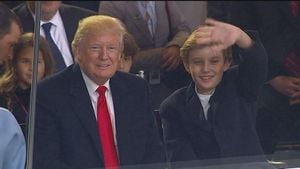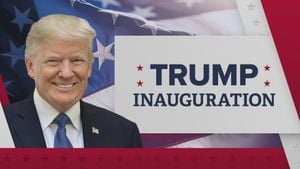President Donald Trump’s recent swearing-in has stirred up much discussion, especially over the fact he did not place his hand on the Bibles held by First Lady Melania Trump during the ceremony. This decision—or perhaps forgetfulness—has led to public speculation and even mockery online, but what does it truly mean?
Interestingly, the U.S. Constitution does not require any president-elect to place their hand on a Bible during the swearing-in ceremony. The simple requirement as per Article II of the Constitution is to recite the oath of office. This has been affirmed historically, with various presidents throughout the years choosing not to use the Bible when taking their oaths.
The swearing-in took place at the Capitol Rotunda, with Chief Justice John Roberts administering the oath. Melania Trump stood beside her husband, holding two significant texts: one was Trump’s personal Bible, which was gifted to him by his mother on the occasion of his Sunday Church Primary School graduation, and the other was the historic Lincoln Bible, which former President Abraham Lincoln used during his own inauguration back in 1861.
Though Trump raised his right hand to take the oath, he left his left arm stiff at his side, sparking curiosity over the absence of the customary gesture of placing his hand on the Bible. Critics were quick to notice this detail. Democratic strategist Adam Parkhomenko tweeted, "No hand on the bible. Does this mean he is not president?" Meanwhile, the anti-Trump Lincoln Project also chimed in with somewhat sardonic tweets, stating, "He didn’t put his small hand on the Bible," thereby amplifying the online buzz surrounding this seemingly trivial aspect of the inauguration.
The Lincoln Bible has not only been historic but also has deep roots tied to American leaders. The Trump team heralded its significance by noting it has been used sparingly, first by Lincoln and later by Presidents Obama and Trump, as both times during their respective inaugurations. After Vance took his oath, Trump and Melania approached Roberts to commence with the presidential oath. It was believed he may have planned to place his hand on the Bibles. Still, whether due to distraction or disregarding convention, he did not.
What is worth highlighting is the fact numerous presidents have diverged from tradition with their choice of text during inauguration ceremonies. For example, John Quincy Adams did not choose a Bible at all during his inauguration, opting instead for a volume of U.S. law. Theodore Roosevelt was famously sworn in without any book, and Lyndon B. Johnson utilized a Catholic missal aboard Air Force One after President John F. Kennedy’s assassination.
During the inauguration, Trump declared, "I swear I will faithfully execute the office of President of the United States and will to the best of my ability preserve, protect, and defend the Constitution of the United States, so help me God." While many presidents opt to echo the closing phrase of “so help me God,” it's not mandated, leaving room for personal tradition to weave its way through the narrative of the oath.
Looking back on Trump’s inaugural ceremony from 2017 when he did place his hand atop the Bibles held by Melania, the juxtaposition makes for interesting commentary on how he navigates tradition now compared to his first tenure. These subtle differences ignite various interpretations about what they entail concerning Trump’s relationship with religion and tradition.
Another layer of the story touches upon Trump’s religious endorsements during his campaign. He previously promoted the “God Bless the USA Bible,” which he termed as “inspired by” country singer Lee Greenwood’s patriotic ballad. Trump also referenced divine protection following his own close brush with death from an assassination attempt just months before taking the oath.
With this latest inauguration, it remains to be seen if Trump’s choice, whether dictated by belief or technique, will forge new pathways for presidents and their relationship with religious texts during such significant proceedings. The American psyche has been molded by these traditions for centuries and any departure from expectation often garners attention and debate.
Overall, Trump’s hand placement—or lack thereof—might be perceived as insignificant by some. Still, it confirms the reality of question and debate surrounding the myriad of presidential traditions. With sentiments running high and divisions seemingly amplifying over even slight deviations, every action from high-profile figures sparks discussions on intent, belief, and legacy.
Unquestionably, Donald Trump drummed up much buzz with the simplicity of his swearing-in ceremony, making for what is sure to be another chapter intertwined with the traditions of American presidential history.



